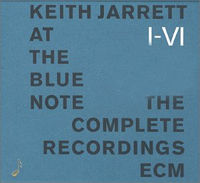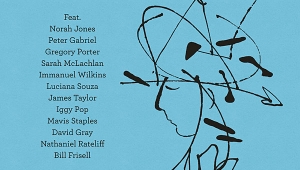| Columns Retired Columns & Blogs |
Recording of December 1995: Keith Jarrett at the Blue Note
KEITH JARRETT: At the Blue Note: The Complete Recordings
Keith Jarrett, piano; Gary Peacock, bass; Jack DeJohnette, drums
ECM 1575-80 (78118-21575-2, 6 CDs only). Manfred Eicher, prod.; Jan Erik Kongshaug, eng. DDD. TT: 7:03:37
Keith Jarrett, piano; Gary Peacock, bass; Jack DeJohnette, drums
ECM 1575-80 (78118-21575-2, 6 CDs only). Manfred Eicher, prod.; Jan Erik Kongshaug, eng. DDD. TT: 7:03:37
Customary as it has become to praise the Jarrett/Peacock/DeJohnette "Standards" ensemble by invoking the classic trio of Bill Evans, Scott LaFaro, and Paul Motian, I submit, with all due respect, that we need to retire that metaphor. For one thing, although the essence of Evans's ensemble continued through several personnel changes, including a version incorporating Gary Peacock, the group was only together for three years. Jarrett, Peacock, and DeJohnette have been working together, if not exclusively, for over 15 years. In that time, the three have achieved a level of communion that results in an ensemble that looks toward no other for its genesis. Here is the new template—all who follow must suffer comparison to this ensemble.
 At the Blue Note documents a three-night stand at that venue: June 3-5, 1994. Each disc represents one set, yet only three songs are repeated among the six shows: "Partners," a Charlie Parker/Keith Jarrett collaboration (!); the standard "Things Ain't What They Used To Be"; and Jarrett's own "No More Lonely Nights." Since this band seems incapable of playing anything the same way twice, even the repeat performances are revelatory.
At the Blue Note documents a three-night stand at that venue: June 3-5, 1994. Each disc represents one set, yet only three songs are repeated among the six shows: "Partners," a Charlie Parker/Keith Jarrett collaboration (!); the standard "Things Ain't What They Used To Be"; and Jarrett's own "No More Lonely Nights." Since this band seems incapable of playing anything the same way twice, even the repeat performances are revelatory.
Jarrett, Peacock, and DeJohnette eschew the typical piano-leads/rhythm-section-marks-time dynamic—not that Jarrett doesn't point the way, but Peacock and DeJohnette have incredible freedom to explore the possibilities suggested by the tunes. You could say that the trio ruminates upon these melodies more than it plays them. Showing immense respect for the songs, they're not slaves to the themes or structures, but their masters; at times they play the tunes, at others they take them apart before your ears and reassemble them in ways you've never imagined. "How Long Has This Been Going On?," nine minutes long, never even states the theme until 8:43 into the song—it's like the sun suddenly breaking through fog.
That these are collective improvisations is never in doubt. You can sense the players' excitement, not to mention the audience's, as they pursue their common goal, and you can feel them egging each other on. For me, the high points are the pieces that reach toward that sense of sustained discovery that Jarrett explored in his solo concerts through the '70—Jarrett originals such as "Muezzin" and "The Fire Within," and Charlie Parker's "Now's the Time." These pieces build upon simple repetition, then flower, fold in upon themselves, and flow in different directions as first one player, then another nudges the song through introspection, ebullience, droning propulsion, gospel fervor—through all the things the songs are, or can be.
And the sound? Amazing. The audience is remarkably quiet; partially, I imagine, in awe at what was unfolding before them, but also because Jarrett insisted that there be no bar service, drinks on the table, or smoking during these sets. Peacock's bass is deep, authoritative, and massive. And no drummer could be more attuned to tonal color than DeJohnette; his cymbal work, always impressive, has been caught with rare vibrancy. His use of pitched accents is precisely revealed—the bronze shimmers and jumps out from the speakers—and his drum sound is massive but never overwhelming; it's physically embodied and packed with punch. Jarrett's piano is totally present. Torrents of notes cascade in fluid articulation, sounding sweet yet powerfully incisive.
A piano trio recorded this well makes an impressive demonstration disc. DeJohnette is placed near the right speaker, Jarrett near the left, and Peacock stands well back in the middle—hey! where'd he come from? The instruments are prominently featured, but there's enough room acoustic to convince you this really took place somewhere. Somewhere intimate—not merely small, but close and personal. With playing of this caliber at this exalted a level of communion, not to mention compelling sound, who wouldn't want to be there?
Thanks to ECM, you can go back as often as you like.—Wes Phillips
- Log in or register to post comments




































